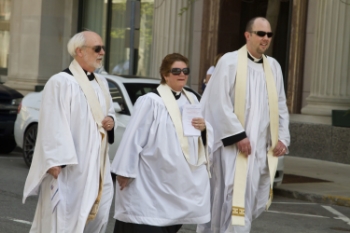Proclaim Good News! This is our joy to do as believers in Jesus Christ. It is also part of Bishop Little’s vision of the future of the Diocese of Northern Indiana… that we “will bequeath to future generations of Christians” the Good News of Jesus Christ. This imperative for our diocese is our focus for this month’s new writings in By Word and Example.
Our Word article is written by Mother Michelle Walker, a proud graduate of our Diocesan Congregational Development Institute (DCDI). Mother Walker reflects on a tool that invites the Holy Spirit into our conversations, the Relationship Life Cycle.
Our Example article, by Kelley Renz, is an eye-witness account of a very public celebration of 175 years of Episcopal ministry in Fort Wayne, where the lay and clergy from all three Fort Wayne parishes were on parade. Bishop Little even joined the procession in a carriage!
Bishop Ed Little commemorating Fort Wayne's 175.
The purpose of By Word and Example is to inspire congregations to act on the Five Imperatives of Ministry for our diocese. If you have an example to share, or would like to provide a word article about a lesson learned, or a book review, please contact me via email.
In His service,
Linda Buskirk
Linda Buskirk, Editor, By Word and Example
Email:
The Relationship Cycle in Real Life
Example: Proclaim the Good News
By Mother Michelle Walker
When I arrived for my first weekend of CDI over six years ago I had NO idea what to expect. My priest had urged me to attend proclaiming that “it would be good for me.” I (mostly) willingly went along. I’ll admit that those first few weekends were tough. Not only was Church Development a new topic for me, the whole experiential approach to learning was not exactly comfortable. What I didn’t realize then, and am only beginning to realize now, is how those skills and tools have formed me and how they help me share my faith in my day to day life.
In the last six months, one tool specifically has risen up to be my constant companion. That tool is the Relationship Life Cycle (page 80 in the CDI manual). You might remember that it begins with Create and Negotiate Relationships, continues on to Agreement, and eventually reaches Stability where everyone is happy. Life is good. The thing with that tool, however, is that it accurately depicts The Rubs, possibly Blowouts, that happen in everyday life when our friends and family don’t do exactly what we want them to do. And from those Blowouts specifically it shows us that we either Withdraw and Terminate the Relationship, Go Back and pretend that nothing happened, or Accept New Realities and then Renegotiate that relationship. Here is where the reality encounters my personal life.
For reasons only known to God, I have experienced Rubs and even Blowouts with several of my good friends in the last six months. I can’t explain where any of them came from but I was able to recognize in the moment that a Blowout was happening. I even went to my CDI manual to refresh myself on the options after Blowout and made a conscious prayerful choice about how I wanted to proceed. For me, it’s natural and even sometimes easy to Withdraw from the relationship. I refused to allow myself to do that. Instead I reminded myself how Christ calls us to be in community with one another, even when it feels overwhelmingly difficult … like it did so many times in the early Church (see Acts for loads of details!). It wasn’t easy for me, nor the early Church. That whole Renegotiating Relationship piece can be painful and full of tears and it was filled with more prayers than I’d ever imagined. However, I can say that on the other side of it is a stronger relationship with the person and a deeper faith, based in experience, that the Holy Spirit is always there to help me. I just have to listen.
Interestingly enough, a few weeks ago I had an opportunity to coach two young men through this very same Relationship Life Cycle. A Blowout hit. A little Withdrawal happened. Then a coming together to discuss the situation followed. I was blessed with the opportunity to help them navigate those murky waters. And who would have thought that on a hot sweaty afternoon at a picnic table I would be proclaiming the Good News of Christ by teaching the Relationship Life Cycle? But I did. As I explained the model, we talked about Jesus and forgiveness and friendship and by the grace of God they came together as friends again. It was a sacred moment for all of us.
I don’t share this story because I am some great CDI trainer that has all the tools and models in her back pocket. I share this story because I believe deep in my heart that the best way we proclaim the Good News of Jesus Christ is through how we act and interact with the people around us, particularly when we’re in a compromised situation. In these instances I was able to utilize a CDI tool to frame the situation and respond in a Spirit-filled way instead of an instinctual-Michelle way. I can guarantee you that the Spirit-filled way is always, always, always going to be better. So I am thankful that I’ve allowed myself to be stretched through my CDI experiences and that God began providing me with tools to share His Love long before I even knew what to do with them. May the tools from CDI (and beyond) do the same for you!
A Proud Moment in the City of Churches
WORD -- Proclaiming the Good News
By Kelley Renz
On May 10, 2014, the three Episcopal Churches of Fort Wayne – Trinity, St. Alban’s, and Grace – gathered with Bishop Ed Little to celebrate the 175th Anniversary of the founding of the Episcopal Church in this, the city of churches. Dozens worked together for months to plan the celebration. Over 200 joined in. Pictures donned the pages of the Journal Gazette. Reporters walked around asking questions, and I – with the others gathered to sing, celebrate the Eucharist, and reconsider our history – smiled broadly and whispered profound gratitude to God.
Reverends Thomas Hansen, Kathy Thomas, and Dan Layden
The priests – Tom, Kathy, and Dan – walked together down Berry Street. They wore their vestments, announcing to every onlooker that this was about God, this parade on a beautiful Saturday morning in May. Our Bishop sat atop a horse-drawn carriage. He made me think of Bishop Kemper, the diocese’s first Bishop, traveling here, perhaps the very same way, and envisioning a parish, a place for those who longed for the liturgy, the word of God, and the Book of Common Prayer.
Bishop Kemper would help Our Lord lay the foundation for three parishes, three separate houses of worship filled with thousands of people who, through the years, have been nurtured, challenged, and sent to proclaim what they received week to week at the hands of God and one another.
On May 10, 2014, we came together to do what they did, and very publicly so.
Trinity's Robert Beatty
Bishop Little reminded everyone this wasn’t a past event we were commemorating; it was a reminder to be the people God calls and enables us to be, to attract others to Him, to spread His message, to fulfill the mandate of our diocese by nurturing a passion for the Gospel of Jesus Christ, a heart for the lost, a willingness to do whatever it takes, and a commitment to one another.
For me, carrying the flag of the Episcopal Church in that parade, and watching my brothers and sisters walk, sing, laugh, talk, and praise God, this celebration was about an identity we were willing to wear in front of the entire city, and I wanted to make sure that identity was well understood. I looked at Ron and Linda, Mick and Kathy. I looked at Nyla. I saw John and Amy with their kids Robert and Julia. I knew we were all so different, different backgrounds, different economic classes, different political beliefs, and probably even different values. But our love for Jesus Christ and our knowledge of His inclusivity, our hunger for the Eucharist, and our deep awareness and recognition that we grow better with one another than separately, that perhaps begins to describe our identity as Episcopal Christians.
Yes, Jesus can be loved in other churches. He can be served and known under different flags, but the flag I carried that day, the flag of the Episcopal Church, reveals Jesus in a unique way, in a challenging and exciting way, in a way each of us, as Episcopal Christians must search for and find the right words to proclaim.



